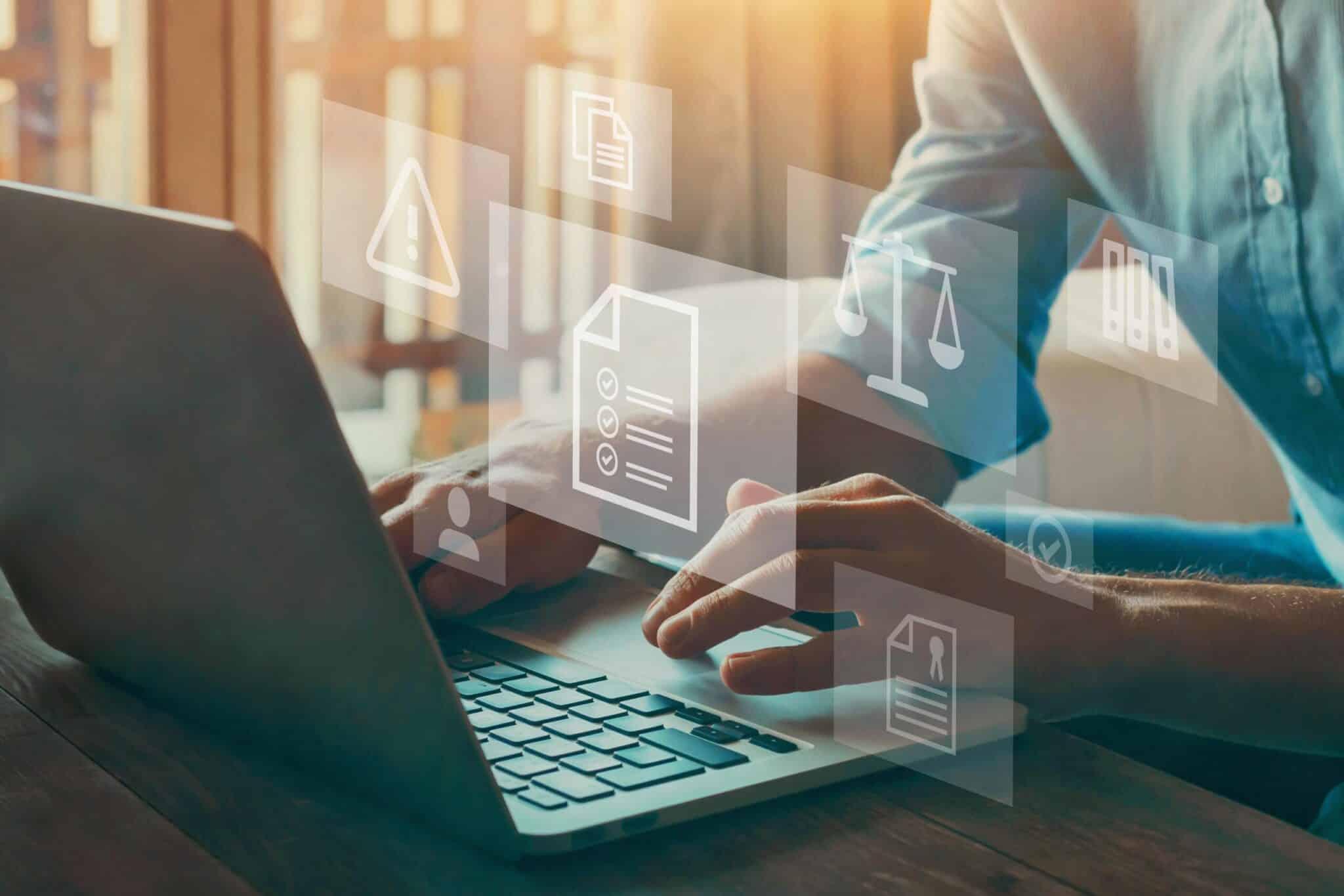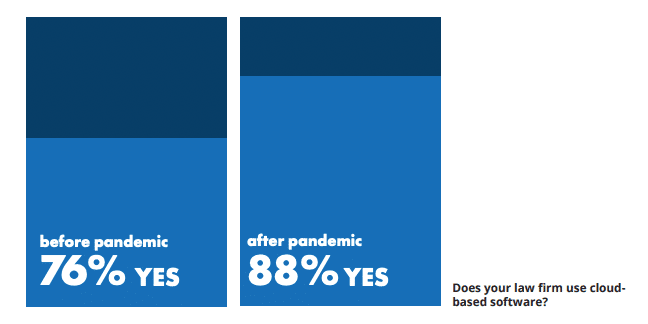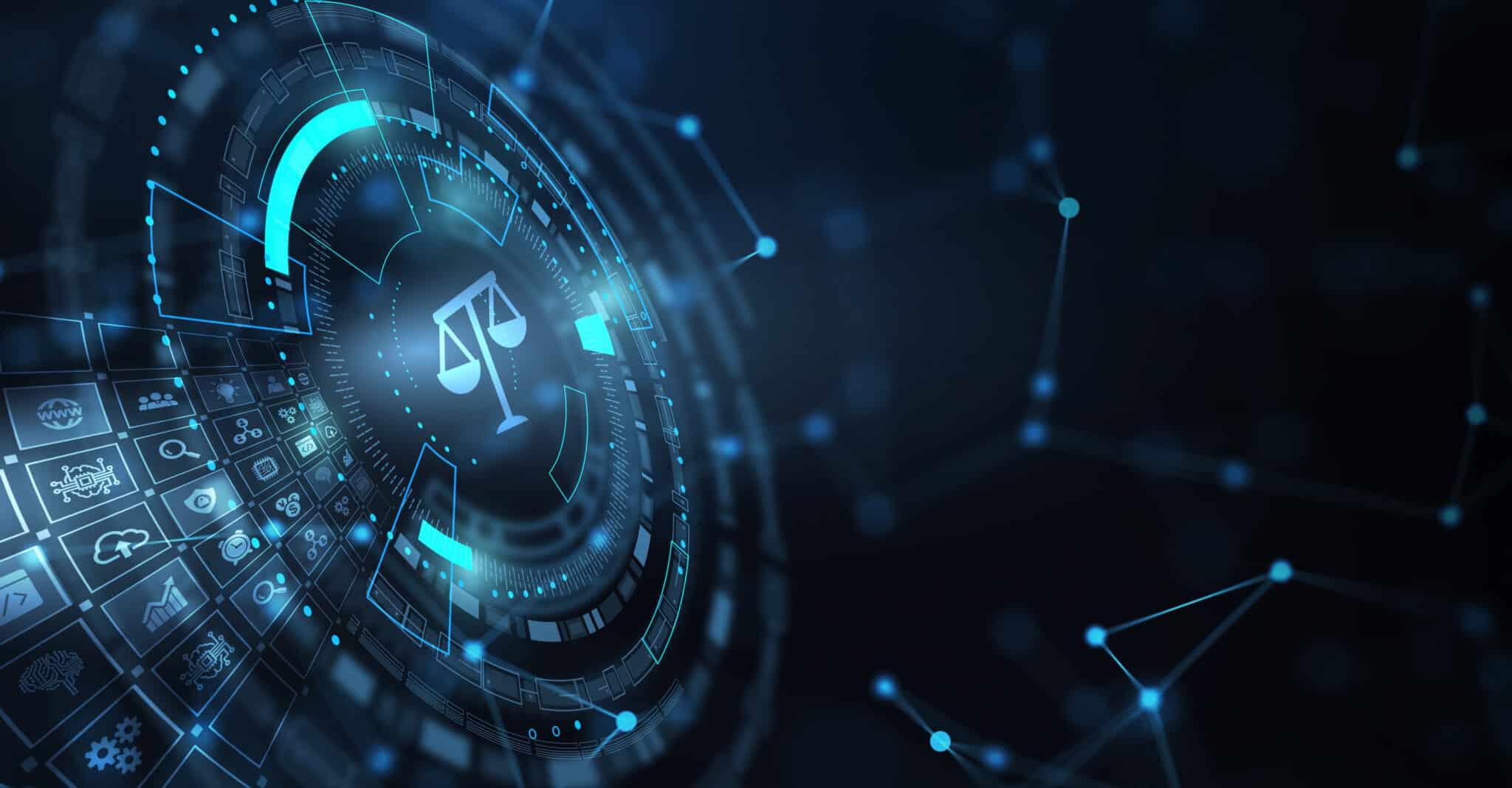SaaS for Lawyers
If you’ve ever used tools like Google Workspace, Microsoft 365, or MyCase legal practice management software, you’re familiar with SaaS—software as a service. SaaS is modernizing the legal industry in two ways: by making law firms more efficient and creating career opportunities for lawyers worldwide.
In this article, we’ll be discussing all things SaaS for lawyers. This guide is ideal for:
Understanding how legal SaaS works (general overview)
Lawyers who want to learn how legal SaaS can improve their law firm’s efficiency and profitability
Students and lawyers who want to learn more about a career in technology law
What is SaaS?
SaaS is a cloud-based software delivery and licensing model. Users subscribe to web-hosted software rather than purchasing a hard copy of it. In the past, law firms had to buy (for example) time-tracking software and install the software license for each user. They also had to maintain server hardware, operating systems, and security features.
Lawyers can now access SaaS time-tracking software and more, using just an internet connection. For instance, MyCase hosts a full suite of legal practice management software features on the cloud. It’s accessible to law firms for a subscription fee—there’s no need to install or maintain the service physically.

Benefits of Legal SaaS
Additional benefits of legal SaaS include:
1. Frequent, automatic, and cost-effective updates
SaaS software providers often request user feedback and update features in response. They can implement frequent updates and push them live—resulting in a better user experience.
2. Scalability
Law firms can more easily scale their software usage as their teams and data usage change, compared to old-school enterprise software.
3. Flexibility
SaaS is ideal for on-the-go or hybrid lawyers and legal teams across multiple offices. Users can access software from anywhere and collaborate on one centralized dashboard.
4. Security
SaaS providers take care of IT security, so users don’t have to worry about the risks and overhead.
5. Affordability
Traditional enterprise software can come with a hefty upfront price tag, which makes it cost-prohibitive for solo practitioners and small law firms. SaaS for lawyers is typically pay-as-you-go and more affordable for firms of all types.
These benefits make it easy to see why legal SaaS adoption continues to grow. In fact, 88% of surveyed lawyers said their law firms use cloud-based software, as shared in the MyCase 2021 Legal Industry Report.

But SaaS isn’t only changing how law firms do business; it’s also providing a new career niche for lawyers.
What Does a Software Lawyer Do?
As the SaaS industry grows, more technology companies need software lawyers. They may hire these attorneys in-house or retain a law firm that offers SaaS legal services. A SaaS lawyer generally helps their technology client protect intellectual property, develop and maintain partnerships, and ensure compliance with various regulations.
An experienced SaaS lawyer is well versed in many facets of technology law, including:
Intellectual property law—patent law, copyright law, trademark law, unfair competition, and rights of privacy and publicity
Contracts and agreements
Data privacy laws and regulations
Intellectual Property Law
A SaaS company’s value lies in its software. SaaS lawyers must protect the organization’s intellectual property to enable profitability and ward off competitors. This may include:
Filing, maintaining, and protecting patents, trademarks, and copyrights
Enforcing the company’s rights against competitors
Defending the company from claims of unfair competition and/or misappropriation of private information or public persona
Advising the company about its intellectual property rights and how to avoid infringing upon the rights of competitors
Contracts and Agreements
One of a SaaS lawyer’s most important duties is drafting and reviewing contracts and agreements. For example, if a software company wants to work with a new client, their lawyer can draft a SaaS agreement outlining the terms of the relationship. This establishes each party’s responsibilities, protects the software company from liability, and helps to reduce risk and prevent disputes.
A SaaS agreement may cover the following elements.
Scope of services
Payment processing
Renewals and auto renewals
Termination
Dispute resolution
Liability
Data privacy and protection
If a SaaS company wants to license out their product, their SaaS lawyer can also draft a licensing agreement. Lastly, a software lawyer often helps clients negotiate deals with third-party vendors regarding security, data infrastructure, uptime, support, and more.
Data Privacy Laws and Regulations
SaaS companies conduct business on cloud storage and manage a lot of client data. A SaaS lawyer must understand the laws and regulations around data storage and ownership, software modifications, and client notifications for data breaches. This applies to all the states and countries where their company does business.

SaaS Lawyer FAQs
If you’re wondering how to become a SaaS lawyer or considering SaaS software for your firm, we’ve got you covered. Our answers to the most frequently asked questions about legal SaaS will help you get started.
How Do I Get Into Tech Law?
What is the Simplest Path?
While there is no one tried and true path for breaking into technology law, the most straightforward path is to get a STEM degree and a J.D. degree. This provides the technical foundation that lawyers need to understand their employer or client’s products and services and to provide appropriate legal advice and counseling.
What if I Have a Non-STEM Degree?
If you already have an undergraduate degree but haven’t yet attended law school, consider attending a tech-savvy law school. Scour class lists for any coursework involving legal technology. You can also network with school alums to gain valuable insights into the technology-related career paths available to law school graduates.
You may also want to take advantage of tools like the Law School Innovation Index, which measures “the extent to which each of the 200+ U.S. law schools prepares students to deliver legal services in the 21st century.”
What if I’m a Practicing Attorney?
If you’re already practicing law and want to pivot into SaaS legal services, get involved with technology at your current company or firm. Try to take on matters involving technology companies or intellectual property, or opt to lead your firm’s legal technology committee. Additionally, you can always study STEM material on nights and weekends. This may include data privacy and protection regulations or the latest cybersecurity best practices.

Where Do Tech Lawyers Work?
1. Big Tech companies
Most of us are familiar with Big Tech companies in Silicon Valley, New York, Austin, and similar major metropolitan areas. These technology powerhouses frequently need SaaS legal services, although the job opportunities can be highly competitive.
2. Smaller technology companies
There are also plenty of opportunities outside of Big Tech. Startups and small- and mid-sized technology companies also need legal counsel to help protect intellectual property.
3. Businesses outside of tech
Companies in industries ranging from finance to manufacturing are migrating to cloud computing, adopting cloud-based security solutions, and developing technology-related intellectual property. These non-SaaS companies also may need expertise from a SaaS lawyer.
4. Law firms
Many technology lawyers work at firms that service technology clients and those with tech needs. In fact, a Bloomberg survey of technology lawyers found that 81% of law firms typically provide technology-related legal services to IT companies. Additionally, more than half of law firms serve clients outside the technology sector, and 25% serve venture capital funds.
How are Law Firms Using Cloud and Legal SaaS Software?
Legal SaaS software is improving law firm productivity and profitability. For example, MyCase legal practice management software includes:
Billing and payments technology that streamlines the entire invoicing and payments process, so you can get paid faster and more efficiently.
Calendaring software that combines appointments, meetings, and events into one calendar so you can manage deadlines across your entire firm.
Time-tracking software that tracks time as you work on cases for greater profitability and more accurate billing.
Document management that allows you to store, sign, edit, and share case documents in a centralized cloud database.
Workflow automation that automates your busy work and gives you back more billable time.
More than 14,000 law firms choose our SaaS for lawyers because it works. On average, MyCase customers see a 38% increase in caseloads and gain at least three billable hours per day. Proving technology is necessary for lawyers today, we see companies are using chatbot lawyers and AI lawyers as well. You can check out the benefits of virtual legal assistants as well.
Experience the difference for yourself—try MyCase free for 10 days.
About the author

Morgan MartinezSenior Content Manager
Morgan Martinez is a Senior Content Manager for leading legal software companies, including MyCase, Docketwise, and CASEpeer, as well as LawPay, the #1 legal payment processor. She specializes in writing about the latest advancements in legal technology, financial wellness for law firms, key industry trends, and more.
